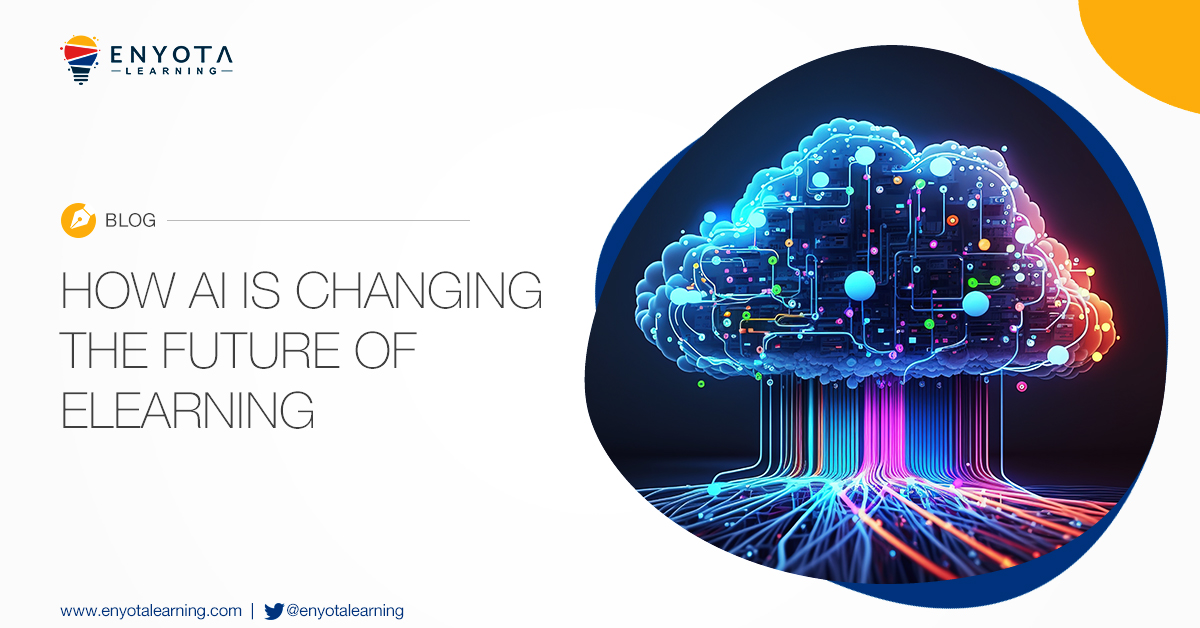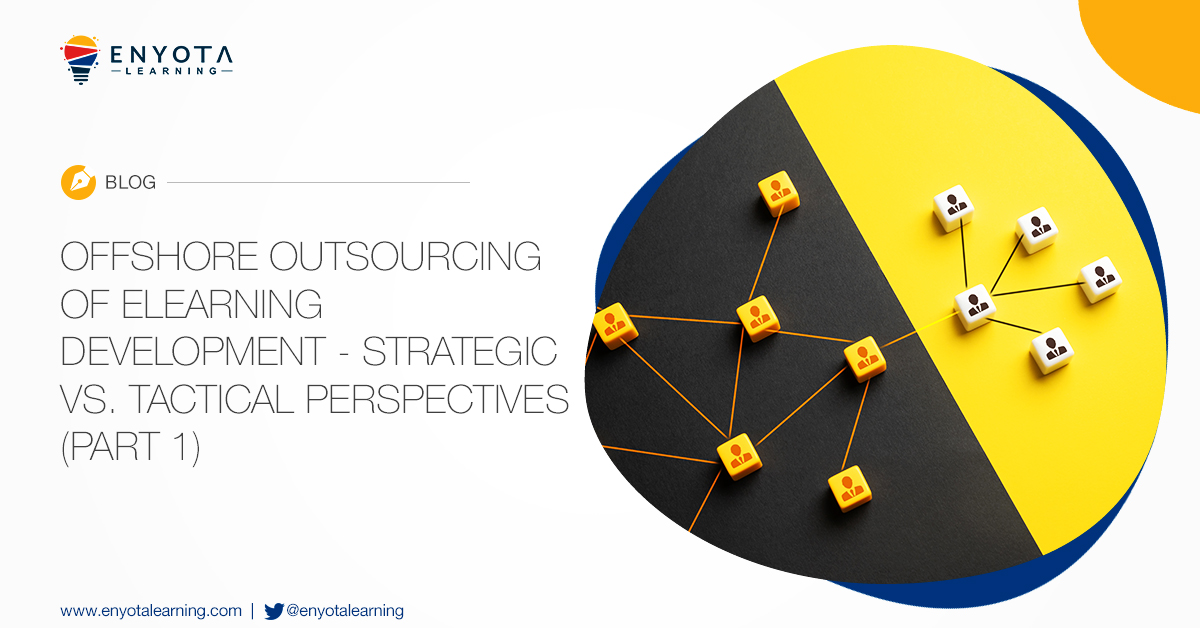Artificial Intelligence (AI) is changing the eLearning landscape. Personalized, engaging, and effective learning experiences are 3 things that are important to eLearning development because they directly contribute towards helping learners achieve their goals in a quick and efficient manner.
There are many ways to create personalized, engaging, and effective learning experiences. One way is to use assessments to track learner progress and adjust the content as needed. Another is to use technology to curate content and provide feedback in a way that is personalized. We are going to talk about the latter and discuss the role of AI in eLearning.
Businesses are quickly realizing that AI can be used to create more personalized, engaging, and effective learning experiences. As such, the future of AI integrated eLearning is expected to be beneficial for both learners and eLearning providers.
AI can help learners learn more effectively by providing them with personalized content and feedback. This can help learners stay motivated and engaged in the learning process. For eLearning providers, AI can help them quickly build the foundation needed to build high-quality eLearning courses. Every eLearning course is built on a foundation of SME generated content, AI is currently very good at creating content and AI can help eLearning developers save money and time by contributing towards content creation.
There are also some potential concerns about the use of AI in eLearning. One concern is that AI could be used to create biased or discriminatory learning experiences. Another concern is that AI could be used to track and monitor learners without their consent.
However one sees it, AI is changing the future of eLearning and we are going to take a closer look at it.
AI is Personalizing, Engaging, and Creating Effective eLearning to Reshape How Online Training is Being Designed
- Personalized Learning
AI is being used to personalize the learning experience for each learner. Personalization helps learners learn more effectively by providing them with content and activities that are tailored to their individual needs and interests. - Engaging Learning
AI is also used to create engaging learning experiences that keep learners motivated and interested. This can be done by using chatbots, as well as by providing learners with opportunities to collaborate with AI itself. - Effective Learning
AI is also used to create effective learning experiences that help learners achieve their goals. This can be done by providing learners with personalized feedback, tracking their progress, and allowing AI to identify areas where learners need additional support.
Examples of AI Usage to Personalize, Engage, and Create Effective Learning Experiences
- Adaptive Learning
Adaptive learning uses AI to personalize the learning experiences for learners by tracking learner progress and adjusting the content as needed. For example, if a learner is struggling with a concept, AI can provide additional support or suggest resources. Such personalized training engages learners and increases the effectiveness of training. Read more about adaptive learning. - Recommendation Engines
Recommendation engines use AI and recommend content to learners based on their interests and previous learning history. AI helps learners find a course that is relevant and which they are likely to find engaging. By clustering important topics together, AI can greatly improve the effectiveness of training. Recommendation engines give learners the option to learn multiple other topics that the learner may not have considered before. - Personalized Feedback
AI also provides learners with personalized feedback about their training. AI can help learners identify areas of improvement and can motivate learners to continue learning. Feedback greatly improves the effectiveness of training when correctly provided to the recipient. - Chatbots
Chatbots are AI-powered programs that can simulate conversations with humans. Chatbots can be used to provide learners with support, answer questions, and provide feedback. For example, a chatbot could be used to answer questions about a course or provide feedback on a learner’s work. Chatbots greatly increase the engagement of the eLearning course as it’s able to mimic virtual conversations, almost making it appear as though the learner has continuous access to conversing with an experienced trainer. - Virtual Reality (VR)
VR is a technology that allows users to interact with a simulated environment. VR can be used to create immersive learning experiences that can help learners understand concepts more easily. For example, a VR experience could be used to simulate a surgery or a chemical reaction. - Augmented Reality (AR)
AR is a technology that overlays computer-generated images onto the real world. AR can be used to create interactive learning experiences that can help learners learn by doing. For example, an AR experience could be used to help learners learn about anatomy or to practice a skill.
These are just a few examples of how AI can be used to create personalized, engaging, and effective eLearning. As AI technology continues to develop, we can expect to see even more innovative and effective ways to use AI in eLearning.
Benefits of Using AI to Personalize, Engage, and Create Effective eLearning
- Increased Learner Engagement
When learners are engaged in the learning process, they are more likely to be motivated to learn and to retain the information they are learning. - Improved Learner Outcomes
eLearning can help learners achieve their goals more quickly and efficiently. - Reduced Learner Costs
eLearning can help learners save time and money by allowing them to learn at their own pace and in a way that is tailored to their individual needs. - Increased Learner Satisfaction:
eLearning can help learners feel more satisfied with their learning experience.
The Future of AI in eLearning
The future of AI in eLearning holds immense potential to revolutionize the learning experience in the following ways:
- Building Upon Personalized Learning
AI should one day be able to analyze even larger volumes of data about learners, including their preferences, strengths, weaknesses, and learning styles. This information can be used to personalize the learning experience by providing customized content, adaptive assessments, and tailored feedback. AI-powered algorithms can adapt the curriculum and pace of learning to match everyone’s needs, maximizing their learning outcomes. - Introducing Intelligent Tutoring Systems
Hopefully, AI may soon act as a virtual tutor, providing real-time guidance and support to learners. By analyzing learner performance and behavior, AI tutors can identify areas of difficulty and provide targeted assistance, explanations, and remediation. These systems can simulate human-like interactions, answer questions, provide explanations, and adapt their responses based on learner input. - Natural Language Processing
AI-powered natural language processing (NLP) capabilities can enhance communication between learners and eLearning platforms. This technology allows learners to interact with educational content using their natural language, enabling them to ask questions, seek clarification, and receive instant responses. NLP is currently facilitating the development of chatbots or virtual assistants that can provide immediate support and answer queries. - Intelligent Content Creation
AI can automate content creation processes, making it easier and faster to develop high-quality eLearning content needed to build robust eLearning courses. AI algorithms can generate interactive and engaging content, including images, scenarios, quizzes and assessments. This automation can help reduce the time and cost involved in content creation while ensuring its relevance and effectiveness. - Data-Driven Insights
AI can analyze vast amounts of learner data, generating valuable insights into learning patterns, preferences, and performance. This data can be used to improve instructional strategies, identify areas for improvement, and make data-driven decisions. Educators and institutions can leverage AI analytics to assess learner progress, predict future performance, and implement personalized interventions. - Intelligent Assessment and Feedback
AI can revolutionize the assessment process by automating the grading of assignments, quizzes, and exams. AI algorithms can evaluate responses, provide instant feedback, and generate detailed performance reports. This automation will not only save time for educators but also enable timely feedback and personalized recommendations for learners.
Things to Remember When Using AI for eLearning Development
First and foremost, AI is only good enough to help create supporting assets needed to build complete eLearning courses. You cannot expect AI to use adult learning principles and instructional design theory to design an actual eLearning course Read more here.
AI will definitely reshape the eLearning space but the actual art of building eLearning courses using AI is still a far-fetched idea, especially since building eLearning requires human abilities such as thinking critically, understanding learners and their feelings, taking business specific decisions, incorporating brand values and beliefs, and so on. Something that AI is not capable of doing.
So while it’s not as straightforward to build eLearning courses using AI, what can help you is that AI makes content creation simpler, i.e.: you can now create content faster and provide it to an eLearning development agency to complete and package the content into a high-quality eLearning course with instructionally sound design. This is a big thing because many businesses totally avoid training and eLearning because they fear the complex task of creating the content needed to build an eLearning course.
Concluding
We are experienced eLearning developers and if your company is looking for eLearning development services or an eLearning solution like an LMS, we have you covered. Just reach out to us at contact@enyotalearning.com or click on this call-back form and we’ll reach out to you shortly. Also, test our LMS free for 30 days!




